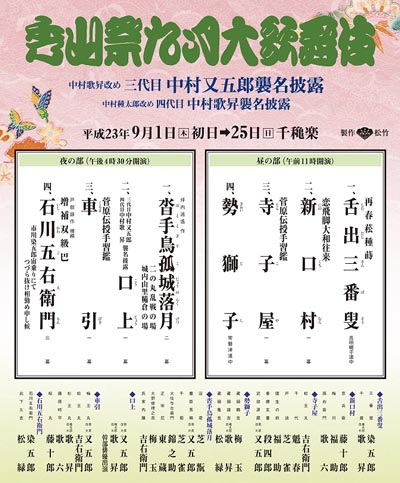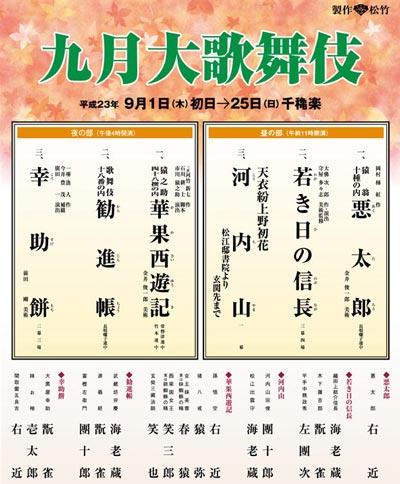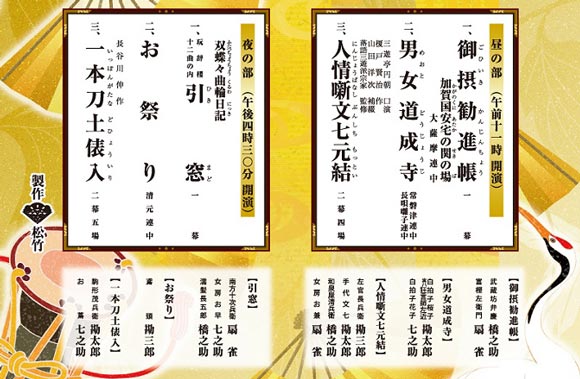| Comments |
This is the 5th edition of a special program called "Shűzan Matsuri" (the festival of Shűzan), which is produced at the Shinbashi Enbuj˘
to commemorate the great actor Nakamura Kichiemon I, whose's haimy˘ was Shűzan.
The star of this program is his adopted son Nakamura Kichiemon II. this is also a great opportunity to celebrate two shűmei:
Nakamura Kash˘ III and his son Nakamura Tanetar˘ IV
take the respective names of Nakamura Matagor˘ III and Nakamura Kash˘ IV.
Shitadashi Sanbas˘:
(The Sanbas˘ with his Tongue sticking out)
Based on the ritual play "Okina" in the N˘ theatre, the sanbas˘ is both an important prayer for prosperity and a
vigorous dance. This particular version takes its title from the sanbas˘ sticking his tongue out.
Some say that this is from absorption in the joy of his dance. Others say that this is an auspicious sign.
In any case, this vigorous and joyful dance is exhilarating to watch and is a perfect addition to
this auspicious program. Featuring Ichikawa Somegor˘ and the new Nakamura Kash˘.
Ninokuchi-mura: in the pleasure quarters, the most important possessions were money and reputation.
In danger of losing his lover, the courtesan Umegawa (Nakamura Fukusuke), the money courier Kameya Chűbŕ (Sakata T˘jűr˘) breaks the seals on a
package of money entrusted to him after being taunted by a rival, even though the use of such money is punishable
by death. In this scene, on their way to love suicide, the couple go through the snow covered landscape on
their way to the man's home town where they will meet their end. Featuring also Nakamura Karoku in the role of Chűbŕ's father Magoemon.
Terakoya: Genz˘ and his wife Tonami run a small school and are
protecting Kan Sh˘j˘'s son and heir, saying that he is their son. However,
word has gotten out Kan Sh˘j˘'s son is there and Genz˘ has been ordered to
behead him. Moreover, Matsu˘maru is to come to inspect the head. Their only
alternative is to kill one of the other students as a substitute, but all of
the students are farmer's children who could never pass for the son of a court
aristocrat. However, a new boy arrives that day and Genz˘ makes the terrible
decision to kill him in the place of his lord. As it turns out, Matsu˘maru has
sent his own son to be sacrificed, because of his family's long loyalty to
Kan Sh˘j˘. But he must face the most terrible situation for a father,
inspecting the head of his own son and lying when he says that it is the
genuine head of the son of Kan Sh˘j˘. Finally Matsu˘maru reveals his true
feelings to Genz˘ and he and his wife Chiyo mourn their dead son.
Starring Nakamura Kichiemon as Matsu˘maru, the new Nakamura Matagor˘ as Genz˘, Nakamura Kaishun as Chiyo and Nakamura Shibajaku as Tonami.
Kioi Jishi: this dance shows an Edo festival with its lively lion
dance and other entertainments. The festival is full of handsome firemen and
attractive geisha who do a series of graceful dances. One of the highlights of
this dance is the story of the Soga brothers avenging the death of their father
by attacking their enemy during a hunting party for the Sh˘gun at the foot of
Mt. Fuji. Featuring Nakamura Baigyoku, Onoe Sh˘roku and the new Nakamura Kash˘.
Hototogisu Koj˘ no Rakugetsu: although in the late 16th century
Toyotomi Hideyoshi ruled Japan, after his death, control quickly passed to
Tokugawa Ieyasu, and the fate of Hideyoshi's clan, his wife Yodogimi and
young son Hideyori was sealed in a series of battles over their stronghold,
ďsaka castle. First performed in 1905, this is a play by Tsubouchi Sh˘y˘,
famous as the first translator of Shakespeare's plays. The mad scenes of
Yodogimi as the clan goes down to defeat are reminiscent of those of Lady
Macbeth and have turned out to be the source of the enduring popularity of
the play. Featuring Nakamura Shikan as Yodogimi in a
role created by Nakamura Utaemon V and
carried on by his son, Nakamura Utaemon VI.
Featuring the new Nakamura Matagor˘ as Toyotomi Hideyori.
Featuring also Nakamura Kichiemon, Nakamura Baigyoku, Nakamura Shibajaku, Nakamura Kinnosuke and Nakamura T˘z˘.
K˘j˘: the close relationship between the actors and the audience
is shown by these stage announcements, lavish ceremonies to commemorate various
important events. This monthĺs program commemorates the actor Nakamura Kash˘ III
taking the name of Nakamura Matagor˘ III and his son Nakamura Tanetar˘ IV
taking his name of Nakamura Kash˘ IV. The top actors in Kabuki all appear to offer their congratulations.
Kurumabiki: this short scene shows the three brothers that dominate
the drama "Sugawara Denju Tenarai Kagami",
each with a distinctive personality. Sakuramaru (Sakata T˘jűr˘) and
Ume˘maru (the new Nakamura Matagor˘) have been rendered
masterless by Kan Sh˘j˘'s exile. The third brother Matsu˘maru (Nakamura Kichiemon) serves
the villain Shihei (Nakamura Karoku), who is responsible for the downfall of Kan Sh˘j˘.
Sakuramaru and Ume˘maru try to destroy Shihei's carriage but are stopped by Matsu˘maru
and the magical glare of Shihei. Finally the brothers agree to suspend their disputes
until they all meet at their father's seventieth birthday party.
Featuring also the new Nakamura Kash˘ in the role of Sugi˘maru.
Ishikawa Goemon: in the time of the warlord Toyotomi Hideyoshi, Ishikawa Goemon was a famous
larger-than-life thief. When he was executed by being boiled alive, he is said to have
defiantly said that the sands on the beach may run out but thieves will never disappear from this world.
In this play, a rare revival, Goemon hides in a giant basket, which then flies through the air.
As the basket goes to the ceiling of the theater, suddenly Goemon burst out and travels triumphantly through the sky.
This production stars Ichikawa Somegor˘ and Onoe Sh˘roku as Goemon and Konoshita T˘kichi.
Source: Earphone Guide website
|


